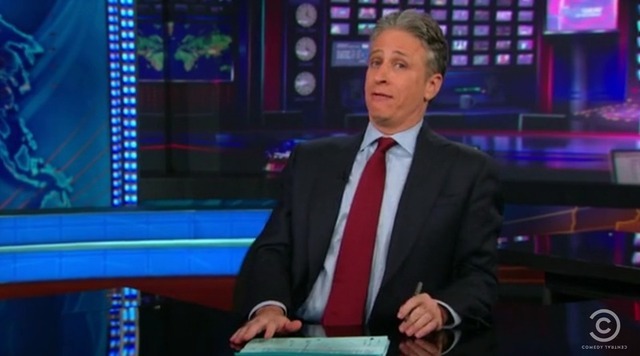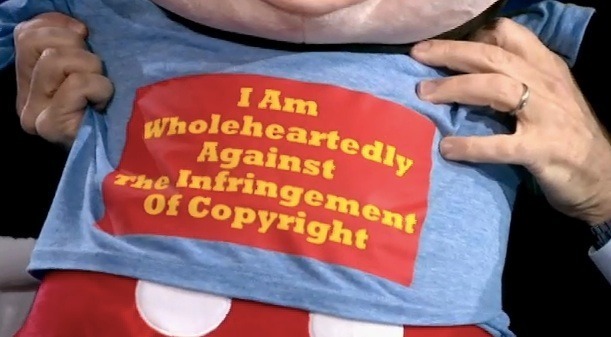
"Tomorrow night," announced host Jon Stewart at the beginning of The Daily Show yesterday, "our guest will be the Internet."
The odd intro came about thanks to a redditor, who showed up to a Daily Show taping yesterday with VIP passes. Knowing he would have a chance to ask Stewart a preshow question, the redditor pondered ideas and settled on SOPA, the hugely controversial Stop Online Piracy Act now being considered in Congress. "The Internet sent me to ask you what you think of SOPA and why you haven't mentioned it on the show," he said to Stewart.
Stewart wasn't familiar with SOPA, asking if it was related to net neutrality, but admitted that his team had been consumed with the presidential election race recently. He promised to look into SOPA, and turned to one of his writers when he said it. At the show's open, Stewart then made a reference to SOPA and added, "I have some reading to catch up on."
Jeff Jarvis, pundit and professor, was also in the audience for the taping. He confirmed the preshow story and added, "Confidential to Mr. Stewart: The problem here is that [cough] your industry, entertainment, is trying to give power the power [sic] to blacklist and turn off sites if they’re so much as accused of 'pirating' (their word, not ours) content. This changes the fundamental architecture of the net, giving *government* the power and means to kill sites for this and then other reasons... Please, sir we need your force of virtue to beat down this, another evil. On behalf of The Internet, thank you."
The redditor too is pinning his hopes on Stewart. "I almost lost my mind when he mentioned it in the intro," he noted.
Stewart and Stephen Colbert, whose own show follows The Daily Show, have become unlikely comedians for the geeks. Colbert, for instance, last year picked up our HBGary/Anonymous coverage to do a lengthy segment targeting HBGary Federal CEO Aaron Barr. "To put this in hacker terms," Colbert said, "Anonymous is a hornet's nest, and Barr said, 'I'm going to stick my penis in that thing.'"
And Colbert has already covered SOPA. Back in December, he had a segment on the bill in which he claimed to be so against the infringement of copyright that he "had the phrase trademarked and emblazoned on a Mickey Mouse doll." He went on to host a brief debate on the subject between band manager Danny Goldberg and Harvard prof Jonathan Zittrain.

What are the real views of Colbert and Stewart regarding online piracy? It's hard to say. When I visited Viacom General Counsel Michael Fricklas at Viacom's Time Square headquarters a few years back to talk about the $1 billion lawsuit he had initiated against YouTube, he admitted that the action wasn't backed by all of the creative types working on Viacom's many shows. Still, he hoped they would come around after learning more about the issue. (Fricklas wanted no part of suing end users, saying that it's "expensive, and it's painful, and it feels like bullying." Consumers "need to be treated with respect," he added.)
Colbert's segment on SOPA seems to mock some of the bill's provisions, but in the interview, he goes on to claim that video clips of his show at one point accounted for 25 percent of YouTube's traffic. This may be an exaggeration, but Viacom was in fact furious over just how many clips of The Daily Show and The Colbert Report appeared on YouTube in its early days. (NBC was similarly furious over SNL's "Lazy Sunday" digital short, which generated more than 7 million streams on YouTube; YouTube has countered that it helped rebuild the show's popularity.)
But Google said in a court filing that some Viacom execs wanted the material to stay up because it made for great marketing.
For years, Viacom continuously and secretly uploaded its content to YouTube, even while publicly complaining about its presence there. It hired no fewer than 18 different marketing agencies to upload its content to the site. It deliberately "roughed up" the videos to make them look stolen or leaked. It opened YouTube accounts using phony email addresses. It even sent employees to Kinko's to upload clips from computers that couldn't be traced to Viacom. And in an effort to promote its own shows, as a matter of company policy Viacom routinely left up clips from shows that had been uploaded to YouTube by ordinary users. Executives as high up as the president of Comedy Central and the head of MTV Networks felt "very strongly" that clips from shows like The Daily Show and The Colbert Report should remain on YouTube.
Given how well both Stewart and Colbert are doing, in part thanks to rabid support among Internet communities like reddit, it's inconceivable that they would come out in support of SOPA—no matter how many half-muffins corporate parent Viacom passes out to employees. But it would fascinating to know how they really felt in earlier years, when their clips did huge traffic on YouTube and Hulu didn't yet exist. Did at least a part of them feel like they were being ripped off?
Listing image by Photograph by Comedy Central/Viacom
reader comments
108